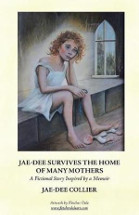Jae-Dee survives the home of many mothers by Jae-Dee Collier

Balboa Press, 2018. ISBN: 9781504315692.
(Age: 14+) Highly recommended. Jae-Dee's sad story of abandonment to
an Adelaide orphanage as a three year old in the 1950s is
fictionalised, told from the point of view of the child. So it's the
child's voice we hear as she struggles to make sense of the world
she finds herself in, longing for love but always receiving
rejection and humiliation from Sster, as the children call the nun
in charge. Sster Grace couldn't be more removed from the idea of
grace; she is harsh and cruel, beats the children in her charge and
subjects them to cruel taunting and humiliation. Jae-Dee is a
bed-wetter, and as a three year old has to drag her sheets to the
laundry, hand-wash them, and drag the clothes basket to the
clothesline.
Jae-Dee has beautiful memories of her parents, a handsome couple
gliding across the ballroom. She longs to be with them. But whilst
they are good intentioned, they are a fragile couple, her mother ill
and teetering on depression and her father too fond of the drink.
Nevertheless, for Jae-Dee it is the love of her mother and father
that she constantly craves - she desperately wants to be reunited
with them and with her younger sisters. It is the abuse and lack of
love in the orphanage that becomes the most damaging experience.
Collier clearly writes from her memories; she captures exactly how a
three year old struggles with the stairs, planting both feet on each
step, and then how she skips to keep up with the nun's quick stride
along the corridor. We share in the child's love of warm sweet food
like rice pudding, and her detestation of boiled vegetables. And we
empathise with her humiliation and embarrassment as she wakes each
morning in a wet bed. From time to time, Collier adds a comment as
an adult, reminding us this all really happened - children who were
so in need of love and care, were kept in the most cold and uncaring
environment, in an institution that was supposed to stand for love
and charity.
At the end of the book, Collier includes the transcript of the Prime
Minister's 2009 apology to the Forgotten Australians and former
child migrants; a recognition and regret for the experiences of
children who suffered neglect and abuse in orphanages, and a
reminder that the protection of children is a sacred duty. It is to
be hoped that in writing her story, Collier finds release from some
of the memories, and strength in knowing she is a survivor.
Helen Eddy